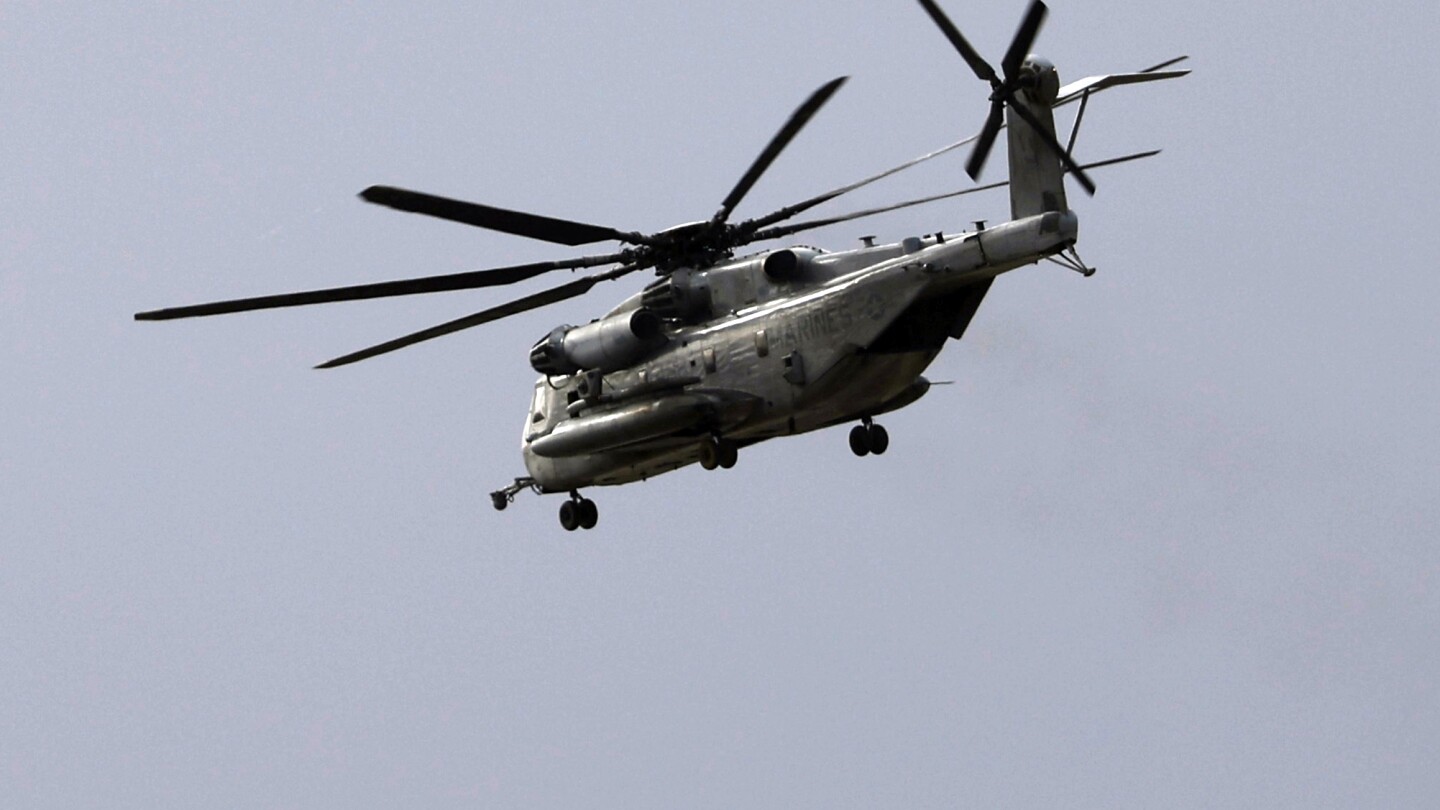SAN DIEGO (AP) — The military said search-and-rescue efforts were continuing for five U.S. Marines after their helicopter went down during stormy weather in the Southern California mountains. Here’s what we know so far:
WHAT HAPPENED
A CH-53E Super Stallion helicopter was returning from a training mission in Nevada when it disappeared Tuesday night. Civilian authorities searching on ground and by air located the aircraft just after 9 a.m. Wednesday near the mountain community of Pine Valley, about a 45-mile (72-kilometer) drive from San Diego. With rescuers having to battle through heavy snow, there was no word Wednesday night on whether they had reached the chopper or on the fate of the five people aboard.
The Marines were flying from Creech Air Force Base, northwest of Las Vegas, where they had been doing unit-level training and were returning home to Marine Corps Air Station Miramar in San Diego, defense officials said.
The last known contact with the helicopter was at about 11:30 p.m. Tuesday, Mike Cornette of the California Department of Forestry and Fire Protection told CBS 8 news. That location was based on a “ping” reported to a Cal Fire dispatch center.
The helicopter, which was designed to fly in harsh conditions, went missing as an historic storm dumped heavy snow and record rain over California. More rain and snow hit the region Wednesday night, forecasters said.
WHO IS MISSING
The people aboard the aircraft haven’t been named but they were assigned to Miramar’s Marine Heavy Helicopter Squadron 361, Marine Aircraft Group 16, 3rd Marine Aircraft Wing, the military said in a statement.
While it can carry dozens of people, the normal crew component for the Super Stallion is four: a pilot, copilot, crew chief, and mechanic/gunner, according to a U.S. Navy website.
President Joe Biden was briefed on the missing Marines, said White House press secretary Karine Jean-Pierre, who answered questions as the president flew to New York City for campaign fundraisers.
“We’re watching this closely and again our thoughts are for the best,” National Security Council spokesperson John Kirby said.
THE RESCUE EFFORT
The military was working with federal, state and local agencies, including the U.S. Forest Service, U.S. Border Patrol, San Diego County Sheriff’s Department and the state Civil Air Patrol.
But weather and rugged terrain made the task difficult. Pine Valley is at about 3,700 feet (1,127 meters) in elevation in the Cuyamaca Mountains, an area which saw as much 8 inches (20 centimeters) of accumulating snow within hours Tuesday night and early Wednesday and saw more falling Wednesday night, according to forecasters.
The area includes San Diego County’s second highest mountain, Cuyamaca Peak, at 6,512 feet (1,985 meters), and is also near the Cleveland National Forest, which covers 720 square miles (1,860 square kilometers) with much of it steep, rocky and with limited trails.
THE HELICOPTER
The CH-53E Super Stallion is the largest helicopter in the military and the Marines have used it for heavy-lifting duties around the world for more than three decades. More than 130 are in operation.
Equipped with GPS, infrared radar and other equipment, the aircraft has performed “a full range of military combat operations in Beirut, Somalia, the Persian Gulf, Afghanistan, Iraq and Libya,” according to a U.S. Navy website.
About 99 feet (30 meters) long, the Super Stallion can move troops and equipment from ships to shore, ferry supplies and launch amphibious assaults.
Nicknamed the “hurricane maker” because of the downwash from its three engines, the Super Stallion has a 50-mile (80.5-kilometer) range. It was designed to carry up to 55 troops or about 16 tons (more than 13,000 kilograms) of cargo both inside and slung outside the cabin.
With an external load, the helicopter can weigh up to nearly 35 tons (31,638 kg).
Two CH-53E helicopters were used in the civil war-torn capital of Mogadishu, Somalia, in January 1990 to rescue American and foreign allies from the U.S. embassy.
The helicopter has been involved in several deadly accidents. In 2018, four Marines from Miramar died when their Super Stallion crashed near El Centro, near the California-Mexico border, during a training mission. The Marine Corps ruled out pilot error for the accident. The victims’ families later sued two companies they alleged provided a defective part that they blamed for the crash.
In 2005, a Super Stallion went down in a sandstorm in Iraq, killing 31 people on board. The accident, blamed on pilot error, was the single deadliest loss of U.S. troops during the war.
___
Baldor reported from Washington. Associated Press writer John Antczak in Los Angeles contributed to this report.

